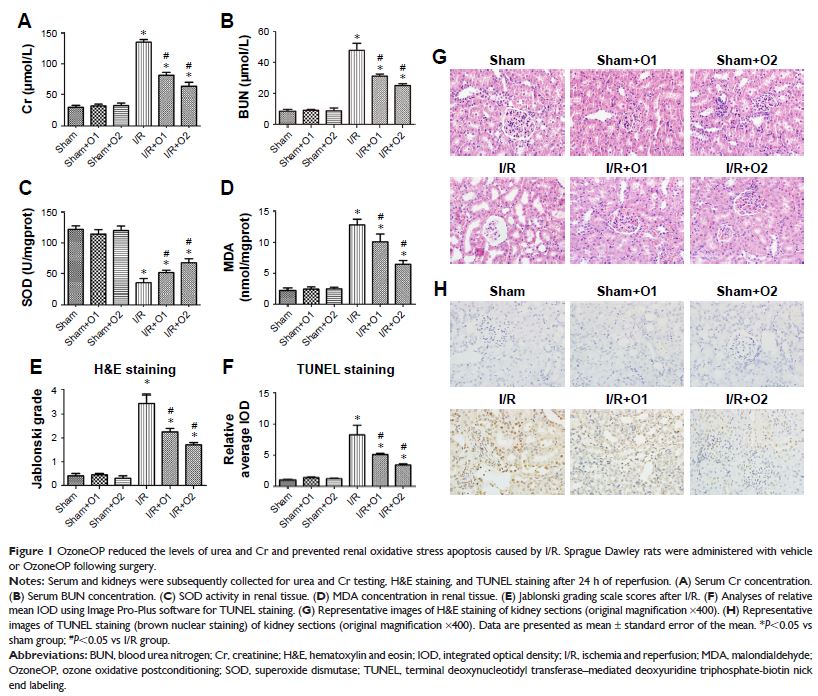108985
论文已发表
注册即可获取德孚的最新动态
IF 收录期刊
- 3.4 Breast Cancer (Dove Med Press)
- 3.2 Clin Epidemiol
- 2.6 Cancer Manag Res
- 2.9 Infect Drug Resist
- 3.7 Clin Interv Aging
- 5.1 Drug Des Dev Ther
- 3.1 Int J Chronic Obstr
- 6.6 Int J Nanomed
- 2.6 Int J Women's Health
- 2.9 Neuropsych Dis Treat
- 2.8 OncoTargets Ther
- 2.0 Patient Prefer Adher
- 2.2 Ther Clin Risk Manag
- 2.5 J Pain Res
- 3.0 Diabet Metab Synd Ob
- 3.2 Psychol Res Behav Ma
- 3.4 Nat Sci Sleep
- 1.8 Pharmgenomics Pers Med
- 2.0 Risk Manag Healthc Policy
- 4.1 J Inflamm Res
- 2.0 Int J Gen Med
- 3.4 J Hepatocell Carcinoma
- 3.0 J Asthma Allergy
- 2.2 Clin Cosmet Investig Dermatol
- 2.4 J Multidiscip Healthc

臭氧氧化后处理通过抑制 MAPK 信号通路来抑制肾缺血再灌注损伤中的氧化应激和凋亡
Authors Wang L, Chen ZY, Liu Y, Du Y, Liu XH
Received 8 February 2018
Accepted for publication 27 March 2018
Published 21 May 2018 Volume 2018:12 Pages 1293—1301
DOI https://doi.org/10.2147/DDDT.S164927
Checked for plagiarism Yes
Review by Single-blind
Peer reviewers approved by Dr Colin Mak
Peer reviewer comments 3
Editor who approved publication: Dr Anastasios Lymperopoulos
Background: Ozone
has been used as a curative agent for a variety of different diseases for over
150 years. In our previous study, we found that ozone oxidative preconditioning
could alleviate renal damage induced by ischemia and reperfusion injury (I/R).
Although this method had obvious protective effects in the reduction of I/R,
its clinical application remains limited because this treatment must be
commenced prior to the ischemic period, which is not practical in the clinic.
Purpose: In the present study, we investigated whether ozone oxidative
postconditioning (OzoneOP) could attenuate renal I/R in vivo and in vitro, as
well as the mechanisms underlying the effects of this treatment.
Methods: Sprague Dawley rats were subjected to right renal ischemia for 45
min and reperfusion for 24 h, or to sham operation with the left kidney
removed, both with and without OzoneOP. In addition, normal rat kidney tubular
epithelial cells (NRK-52E) were chosen to create a hypoxia–reoxygenation (H/R)
model of 3 h hypoxia and 24 h reoxygenation processes, both with or without
OzoneOP and mitogen-activated protein kinase (MAPK) inhibitors.
Results: Our results showed that OzoneOP significantly reversed apoptosis
and the abnormal superoxide dismutase and malondialdehyde levels induced by I/R
or H/R. OzoneOP also inhibited activation of the MAPK pathways both in vivo and
in vitro, which resulted in significant protection against apoptosis and
oxidative stress.
Conclusion: Our current data provide evidence that OzoneOP might serve as a
potential therapy for renal I/R.
Keywords: ozone, ischemia and reperfusion, MAPK
